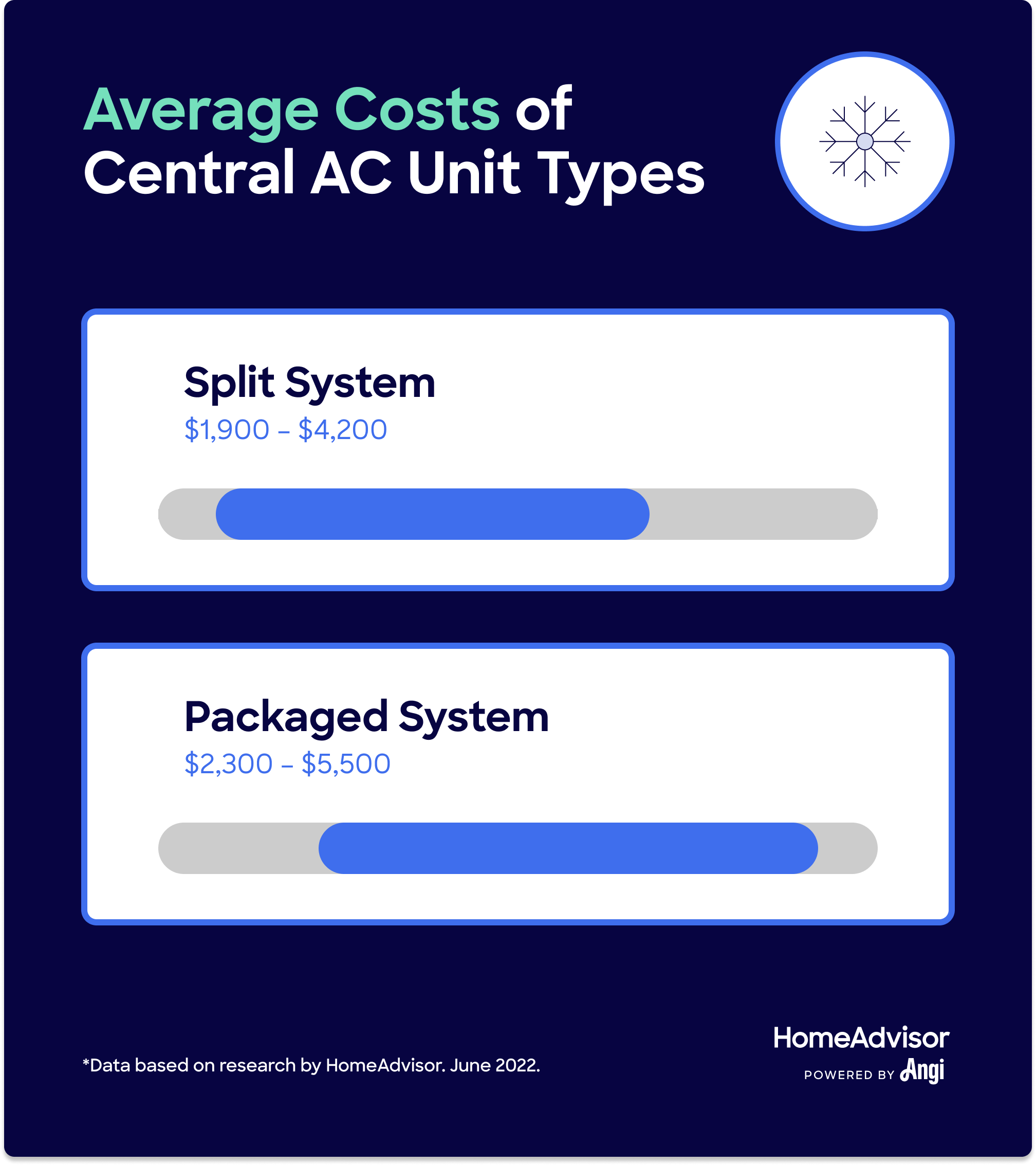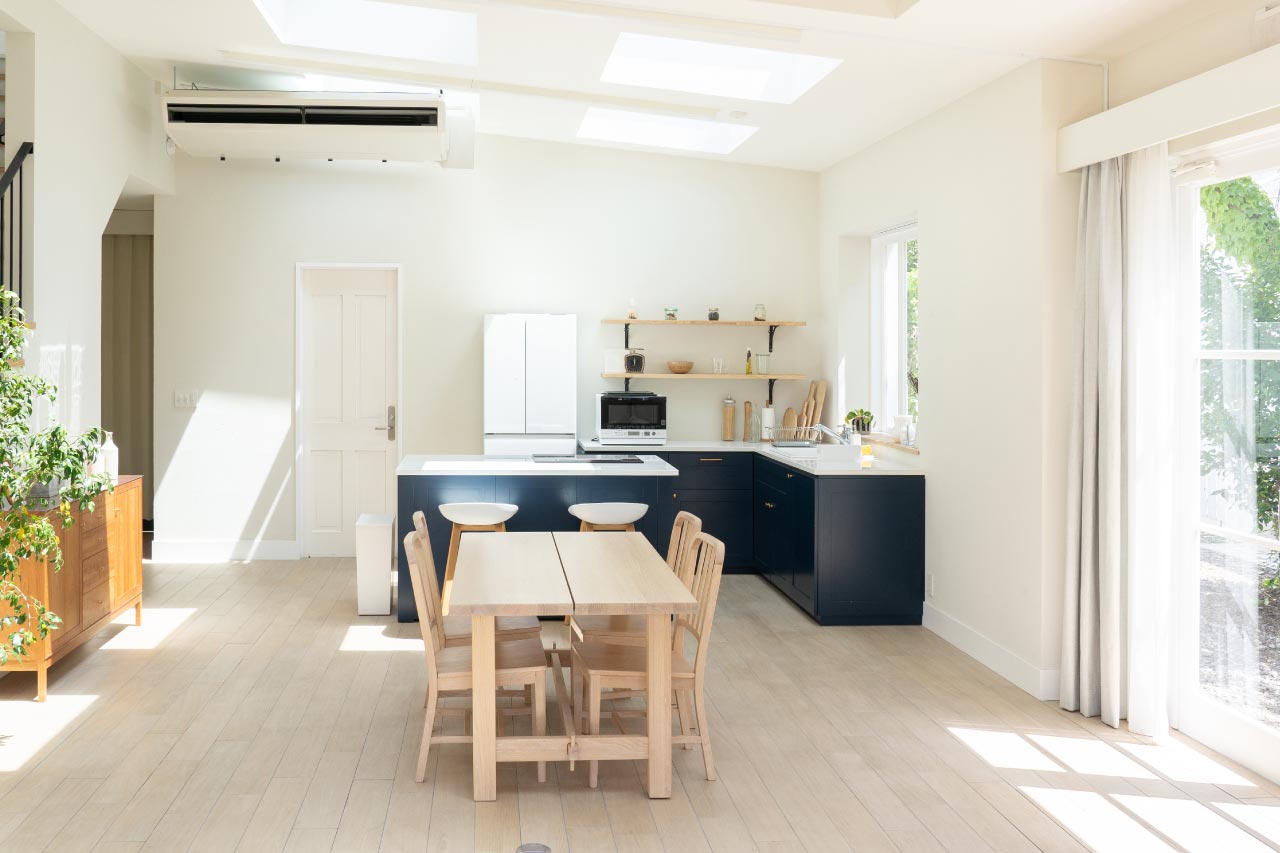How Much Does It Cost to Install Central Air in 2023?
Typical Range:
$3,885 - $7,936
Typical Range:
$3,885 - $7,936
Cost data is based on actual project costs as reported by 23,598 HomeAdvisor members. Embed this data
.
.
.
.
.
.
.
.
.
.
.
.
.
.
.
.
.
.
.
.
.
.
.
.
.
.
.
.
.
.
•
•
•
•
Updated July 25, 2022
Reviewed by Dan DiClerico, Smart Home Strategist and Home Expert.Installing central air conditioning typically costs between $3,885 and $7,936, with an average cost of $5,910. The final price depends on various factors, including:
Unit type
Home and unit size
Seasonal energy efficiency ratio (SEER) rating
Let's calculate cost data for you. Where are you located?
Where are you located?
| National Average | $5,910 |
| Typical Range | $3,885 - $7,936 |
| Low End - High End | $1,500 - $12,000 |
Cost data is based on actual project costs as reported by 23,598 HomeAdvisor members.
There are two types of central air conditioning systems, which we discuss below.
| Central Air Conditioner Type | Average Price Range (Including Installation) |
|---|---|
| Split central air conditioning system | $1,900 – $4,200 |
| Packaged central air conditioning system | $2,300 – $5,500 |
A split system is the most economical central air option at around $1,900 to $4,200. It consists of three main elements: the condensing unit, evaporator coil, and air handler. The condensing unit sits outside, while the evaporator coil and air handler are inside the home.
A packaged central AC system is similar to the split air system, but the condensing unit, evaporator coil, and air handler are all packaged in a single “box” located on the roof or next to the foundation. Packaged systems are less common in residential settings and less efficient. On average, they cost around $2,300 to $5,500.
If you live in an older home without ducts, you may want to forego the cost and construction involved in installing central AC and consider a few other cooling system types instead:
Ductless mini-split air conditioner cost: This mini-split system uses multiple indoor units without the need for ducts. It costs around $2,000–$14,500.
Window air conditioner cost: This unit mounts to your windows and is easy to install on your own. It costs around $150–$500.
Portable air conditioner: A portable unit can be placed anywhere and uses a hose to send heat out of a window. It also costs around $150–$500.
| Air Conditioner Type | Average Price Range |
|---|---|
| Ductless split system | $2,000 – $14,500 |
| Window unit | $150 – $500 |
| Portable unit | $150 – $500 |
Make an informed decision about what kind of AC system you need before installing or replacing a unit since the AC type you choose determines a large percentage of your overall cost. For example, if you decide to have one of the two central air systems installed, you’ll need to hire an air conditioning pro.
Pay attention to the square footage recommendations listed for each air conditioning unit you’re considering. The general rule is that every 500 or 600 square feet require 1 ton of cooling power. However, this calculation can vary.
You can also estimate your overall price based on the British Thermal Unit (BTU) capacity, which measures how many BTUs per hour the AC unit can add or remove from the air. You'll need about 18 BTU capacity per square foot, but anywhere from 14 to 26 BTU capacity per square foot is acceptable.
| Air Conditioner Size in Tons | Capacity (BTUs per Hour) | Average Price Range |
|---|---|---|
| 1.5 | 18,000 | $2,500 – $4,500 |
| 2 | 24,000 | $3,100 – $5,100 |
| 3 | 36,000 | $3,400 – $5,400 |
| 4 | 48,000 | $4,200 – $6,200 |
The rule of thumb is that the bigger the house, the more cooling power is needed. But too big of a system isn't good either because the central air system will cycle on and off all the time, wasting energy and giving off a loud, disruptive noise. On the opposite side of the spectrum, a too-small system will work overtime and cool your house inefficiently. Be sure to consult an AC pro to get the most accurate estimate for this project.
SEER stands for seasonal energy efficiency ratio, and the SEER rating of an AC system is particularly relevant if you live in a climate where the temperature changes drastically. SEER is calculated by determining the cooling output during the winter season divided by its electric input. The higher the rating, the more efficient it'll be. Since 2006, the U.S. Department of Energy has required new central ACs to have a minimum SEER rating of 13. According to the U.S. Energy Information Administration, this will increase to 14 in the northern U.S. and 15 in the southern U.S. by 2023.
The price to install a 14 SEER AC unit is between $3,000 and $6,000. The higher the SEER rating is on your AC unit, the more energy-efficient it'll be. A 16 SEER AC runs from $3,700 to $9,000 to install. At the time of publication, federal tax credits for residential energy-efficient equipment expired on December 31, 2021, but check the Energy Star website for updates on whether any extension or renewal of these credits gets approved by Congress.
Currently, the least expensive central air conditioning unit brand on the market is Payne, with an average price of $1,400. The most expensive AC unit brand is Lennox, coming in at around $3,400. The table below provides general price estimates for the most popular AC brands.
| Air Conditioner Brand | Average Cost |
|---|---|
| Aire-Flo | $1,700 |
| Amana | $2,600 |
| American Standard | $3,200 |
| Armstrong Air | $2,000 |
| Bryant | $2,200 |
| Carrier | $3,200 |
| Coleman | $1,700 |
| Comfortmaker | $1,700 |
| Frigidaire | $2,900 |
| Gibson | $2,300 |
| Goodman | $2,100 |
| Heil | $2,600 |
| Lennox | $3,400 |
| Payne | $1,400 |
| Rheem | $2,500 |
| Ruud | $2,400 |
| Tempstar | $1,800 |
| Trane | $3,300 |
| Whirlpool | $1,900 |
| York | $2,800 |
Labor adds between $500 and $2,500 to the material costs. Installing a brand-new system with all new ducts will require more work than replacing an existing system with ducts already installed.
Depending on your home and current AC system, you may also encounter these additional cost factors.
You'll need a system of ducts and vents for the central AC to work because the unit carries cool air to the various rooms in your home via supply ducts and vents, or openings in the walls, floors, or ceilings covered by grills. Installing ducts and vents costs $500 to $2,100.
A lack of existing ductwork is often why homeowners don't install central air conditioning. If you're installing new ducts, it’s also an excellent time to explore upgrading your heating system, as it'll be cheaper to do both together.
If your air conditioner unit is relatively new, you may want to pay for AC repair costs. Most homeowners will spend about $390 on repairs.
Any newly installed air conditioning unit will come with a manufacturer's warranty, which generally lasts for five to 15 years and may save you money if you're still covered.
Explore the costs of home insulation since your heating and cooling systems will work more efficiently and save you money.
Many central air systems use furnace blowers to distribute cool air throughout the space. If you don’t have a central heating system, installing a cost-effective heating and air conditioning system at the same time can be worth it. You can use the existing fans and duct system for the central air if you already have central heating.
Replacing a central AC costs around $5,000, depending on the size of your home, AC unit brand, and project complexity. Prices can go up as high as $12,500 to replace an air conditioning unit. The labor of removing and disposing of the old system also adds to the cost.
For a skilled DIY-er, installing a central air conditioning system can be a large but doable project. You may need to crawl under your home, lift heavy parts, prepare an installation site, pour concrete, and climb onto the roof. It'll also involve some paperwork since in most places, your local government may require a permit to replace or install large-scale appliances like HVAC systems.
If you hire a local air conditioner installation pro, your technician will complete the entire process for you. They may start with a load calculation—known as the Manual J methodology—to determine the proper unit size for your home. A pro will also look at your home’s insulation, walls, floors, and windows to determine the best model for your needs, as well as examine any leaks, seals, and existing ducts or vents to make sure your AC works at its best. Lastly, pros may even help you get a discount on the unit itself and offer maintenance plans for any future repair work.
It’s important to ensure quality and performance for years to come when you’re installing a new AC unit. During the installation of your central air unit, ask yourself these questions:
Is the unit sized correctly? Pros should be measuring your home and doing load calculations to ensure the equipment is the right size for your home for optimal performance.
Is the duct system right for the AC unit? Ducts that are damaged, leaking, or missing in spots will affect performance. Your local AC repair pro will repair ducts and install more if needed for everything to work seamlessly.
How is the airflow? If the airflow isn't just right, you could see an increase in your utility bill or experience hot spots in certain rooms. A contractor can measure the volume of air reaching the various spaces in your home and adjust ducts and vents for the most optimal airflow.
Deciding if central air is worth the cost depends on your needs and the local housing market. If you live in a mild climate without severe temperatures, window units, fans, or a breeze from an open window may be adequate. But if you live in a hotter climate, it can be worth the price to keep your home at a comfortable temperature and may even save lives during extreme heat waves. This upgrade may also help you sell your home faster, as buyers will pay more for a working AC, especially in a hot environment.
Most AC units last up to 15 years, but if you use them frequently and don't maintain your AC unit, the system could require replacing much sooner.
It can take one to five or more days for a local HVAC installation pro to install central air conditioning. AC replacements take more time, as do projects with extensive ductwork repairs or installations. This extra time can range anywhere from an additional day to another week.

